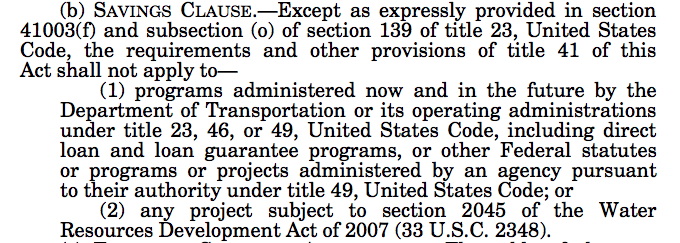Yesterday, the Senate Committee on Homeland Security and Governmental Affairs approved a bill (S. 1976) that would make the infrastructure project permitting reforms in title 41 of the FAST Act (“FAST-41”) permanent.
The committee approved the bill by voice vote after adopting a substitute version of the bill proposed by its sponsor, Sen. Rob Portman (R-OH), as further amended by a Sinema (D-AZ) amendment relating to consultation with Indian tribes.
Portman said in a statement that “The Permitting Council has saved projects more than a billion dollars so far. And we’ve now learned that for projects that voluntarily applied to become covered projects, the permitting process takes, on average, 2.3 years less than it would otherwise. The goal of this legislation is to make FAST-41’s benefits permanent, apply it to more federal projects to ensure they get done on time and under budget, and expand the authority of the Permitting Council to see to it that those things happen. This is good for American jobs, the economy, and the environment.”
FAST-41, and with it, the Federal Infrastructure Permitting Review Council it established, are currently scheduled to expire on December 4, 2022, and the bill approved this week would remove that expiration date and make both permanent.
FAST-41 is under the jurisdiction of the HSGA Committee, which has jurisdiction over the efficiency of federal government operations generally. But to get to President Obama’s desk, FAST-41 language had to hitch a ride on the FAST Act, whose primary committee of jurisdiction is Environment and Public Works. In the EPW sections of FAST, that committee included a “savings clause” in section 11503(b) of the law, which specifically exempted transportation projects and water resources projects from the FAST-41 process. That savings clause reads:

Section 2(h) of S. 1976 as approved by the committee repeals the savings clause printed above, and makes all those projects subject to the FAST-41 interagency review procedures.
This makes it notable that, while S. 1976 did pass committee voice vote, Sen. Tom Carper (D-DE) asked to be recorded as a “no” vote. Carper is the ranking minority member of the EPW Committee, and feels that the separate permitting review process that applies to highway projects (in 23 U.S.C. §139) works quite well.
Carper submitted a statement for the record explaining his “no” vote, as well as a letter from himself and Sen. Kamala Harris (D-CA) and a second letter from environmental groups in opposition.
In his statement, Carper said “We need additional data before we consider any extension of provisions found in Title 41 of the FAST Act beyond the 2022 sunset.” and specifically objected to getting rid of the EPW savings clause.
(A Trump Administration official said earlier that the FAST-41 process provides a range of additional tools that go much further than section 139 of title 23 for large and complex DOT projects, including enhanced government-wide, project-specific oversight to shepherd covered projects through the Federal permitting process, and stressed that participation in FAST-41 is, and would continue to be, voluntary.)
Given how Carper and his EPW chairman John Barrasso (R-WY) have worked on a cooperative, bipartisan basis to assemble their highway reauthorization bill, Carper’s opposition to S. 1976 bodes poorly for its possible inclusion into the surface transportation reauthorization bill (at least so long as it kills the EPW savings clause).




